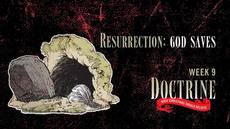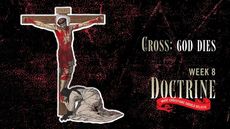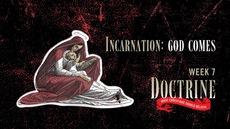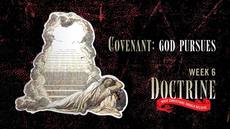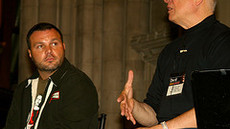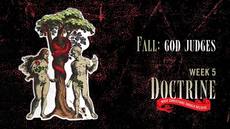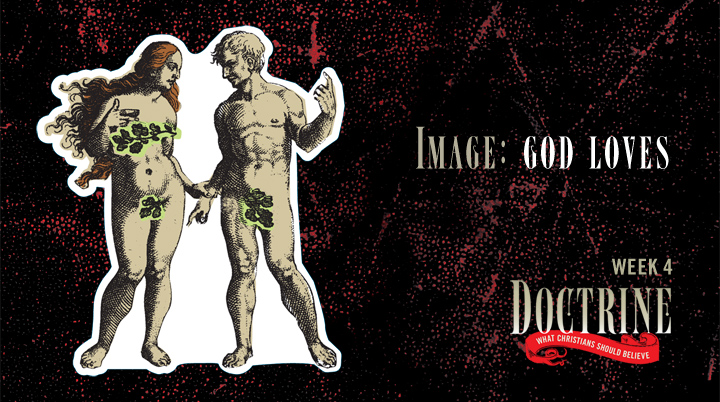
This week (Sunday, April 20) my sermon for the
Doctrine: What Christians Should Believe sermon series examined the doctrine of
imago dei, which means "image of God" in Latin. The question of human life is among the most important because it has implications for seemingly everything, from theology to sociology, history, biology, psychology, and the like. It is this doctrine that answers questions regarding how mankind is different from God the Creator and his creation. It also reveals why we can believe in such things as compassion and equality—truths that an evolutionary worldview simply cannot bring about.
By way of preface, it is important to note the historical development of the Western understanding of the human person, which is nearly entirely seen in terms of an autonomous individual rather than a member of a community. This is due to a historical transition in thought as outlined below:
- Augustine – the importance of the individual as demonstrated in his Confessions
- Rene Descartes – the autonomous, reasoning individual by his statement "I think therefore I am"
- Jonathan Edwards – the autonomous, reasoning individual improved by grace to God’s glory
- Jean-Jacques Rousseau – the autonomous, reasoning individual improved by self-acceptance and self-love so that we are to look in to self and not out to God
- William James – the autonomous, reasoning individual improved by self-acceptance and self-love aided by scientific psychology so that a trained professional and not God is ultimately our savior
- Abraham Maslow – the autonomous, reasoning individual improved by self-acceptance and self-love aided by scientific psychology to self-actualization/glory so that the purpose of my existence is not that God saves me to his glory but rather I save myself to my own glory
What does the Bible reveal about the origin of human life?
Ludwig Feuerbach (19th century) was an atheist who declared that God did not make us, but rather we made God as a figment of our imagination. Students of his thinking include Karl Marx (who applied this politically), Sigmund Freud (who applied this psychologically), and Friedrich Nietzsche (who applied this philosophically). Conversely, in Genesis 1–2 we see that we did not create God, but rather God created us with the following features:
- The Trinity created us.
- A personal God personally created us as persons (e.g., by his hands and not his words like the rest of creation).
- God’s creation of us was loving.
- God made us male and female, which means that while the genders are distinct they are equal.
- God made us originally very good (Gen. 1:31 cf. Eccles. 7:29).
- God blessed us.
- Unlike the animals made according to their "own kind," we were made in the "image of God."
- Because God is Trinity and made us in his image and likeness, we were made for relationships in the following categories:
- With God (theological)
- With self (psychological)
- With others (social)
- With creation (environmental)
What is the place of humans in relation to God and creation?
Yet you have made him a little lower than the heavenly beings and crowned him with glory and honor. You have given him dominion over the works of your hands; you have put all things under his feet, all sheep and oxen, and also the beasts of the field, the birds of the heavens, and the fish of the sea, whatever passes along the paths of the seas. (Ps. 8:5–8)
- Below God as a worshiper
- Above lower creation in dominion
Generally speaking, nearly every error in anthropology involves putting us up to be divine like God or pushing us down to be animals like the rest of creation. Only by seeing ourselves between God and the animals do we have both our humility and dignity.
Where does the Bible say that we are the image of God?
- Pre sin and fall
Then God said, "Let us make man in our image, after our likeness." . . . So God created man in his own image, in the image of God he created him; male and female he created them. (Gen. 1:26–27)
- Post sin and fall
When God created man, he made him in the likeness of God. Male and female he created them, and he blessed them and named them Man when they were created. (Gen. 5:1–3)
Whoever sheds the blood of man, by man shall his blood be shed, for God made man in his own image. (Gen. 9:6)
With it we bless our Lord and Father, and with it we curse people who are made in the likeness of God. (James 3:9)
What does it mean that we are God’s image?
- Moral likenesses – decision-making power, dominion over lower creation, social ability, emotions, communication, etc.
- Non-moral likenesses – intellect/reason, immortal, spirit, ability to create, etc.
Unshared Attributes that belong to God alone (called incommunicable)
- Omnipresence
- Omniscience
- Omnipotence
- Immutability </li
- Eternality
- Sovereignty
Shared Attributes that belong to God and us (called communicable)
- Spirit
- Holiness
- Love/Goodness
- Truth
- Justice/Righteousness
- Mercy
- Beauty
What are some common errors regarding the image of God?
The most common error regarding the image of God is to think that somehow we bear the image of God in only some part of us. We do not have a part of us that is God’s image while the rest of us is not. Instead, we are in totality (mind, body, soul, etc.) the image of God. When a part of us is thought to be the image of God, it is lifted up above the rest of our person in the following ways:
- Body alone – Atheism
- Mind alone – Rene Descartes
- Environmental victim – B. F. Skinner
- Soul alone – John Calvin
- Emotions alone – pop psychology and self-love
The problem with each of these is Romans 1:25, which says idolatry is worshiping anything created. By taking an aspect of our being over and above the rest, we are guilty of worshiping created things such as our body, mind, emotions, soul, or culture instead of the Creator God who makes all things.
Who has best imaged God?
In their case the god of this world has blinded the minds of the unbelievers, to keep them from seeing the light of the gospel of the glory of Christ, who is the image of God. (2 Cor. 4:4)
He is the image of the invisible God, the firstborn of all creation. (Col. 1:15)
He is the radiance of the glory of God and the exact imprint of his nature, and he upholds the universe by the word of his power. After making purification for sins, he sat down at the right hand of the Majesty on high. (Heb. 1:3)
How do we image God?
- In Life
For those whom he foreknew he also predestined to be conformed to the image of his Son, in order that he might be the firstborn among many brothers. (Rom. 8:29)
Put off your old self, which belongs to your former manner of life and is corrupt through deceitful desires, and to be renewed in the spirit of your minds, and to put on the new self, created after the likeness of God in true righteousness and holiness. (Eph. 4:22–24)
Do not lie to one another, seeing that you have put off the old self with its practices and have put on the new self, which is being renewed in knowledge after the image of its creator. (Col. 3:9–10)
- In Death
Just as we have borne the image of the man of dust, we shall also bear the image of the man of heaven. (1 Cor. 15:49)
But our citizenship is in heaven, and from it we await a Savior, the Lord Jesus Christ, who will transform our lowly body to be like his glorious body, by the power that enables him even to subject all things to himself. (Phil. 3:20–21)
What is a life that images God?
And we all, with unveiled face, beholding the glory of the Lord, are being transformed into the same image from one degree of glory to another. For this comes from the Lord who is the Spirit. (2 Cor. 3:18)
A life that images God literally mirrors the glory of Jesus in the way that Moses mirrored the glory of God in the Old Testament.
- By submitting to God and godly authority – e.g., 1 Cor. 11:7 ("For a man ought not to cover his head, since he is the image and glory of God, but woman is the glory of man.")
- By worshiping God – receive revelation, interpret, worship
- By representing God – e.g., Daniel 3
- By serving God – advancing his kingdom and making culture
- By loving all races and peoples, including our enemies, because we are all from one set of parents
- By respecting all human life, especially the weak, oppressed, sick, elderly, and unborn
- By refusing to live autonomous lives and contending for community
For further study on the doctrine of imago dei:
- Grenz, Stanley J. The Social God and the Relational Self: A Trinitarian Theology of the Imago Dei. Louisville, KY: Westminster John Knox Press, 2001.
- Hoekema, Anthony A. Created in God’s Image. Grand Rapids, MI: Wm. B. Eerdmans Publishing Co., 1986.
- Smail, Tom. Like Father, Like Son: The Trinity Imaged in Our Humanity. Grand Rapids, MI: Wm. B. Eerdmans Publishing Co., 2006.
- Volf, Miroslav. After Our Likeness: The Church As the Image of the Trinity. Grand Rapids, MI: Wm. B. Eerdmans Publishing Co., 1997.
 This week (Sunday, April 20) my sermon for the Doctrine: What Christians Should Believe sermon series examined the doctrine of imago dei, which means "image of God" in Latin. The question of human life is among the most important because it has implications for seemingly everything, from theology to sociology, history, biology, psychology, and the like. It is this doctrine that answers questions regarding how mankind is different from God the Creator and his creation. It also reveals why we can believe in such things as compassion and equality—truths that an evolutionary worldview simply cannot bring about.
By way of preface, it is important to note the historical development of the Western understanding of the human person, which is nearly entirely seen in terms of an autonomous individual rather than a member of a community. This is due to a historical transition in thought as outlined below:
This week (Sunday, April 20) my sermon for the Doctrine: What Christians Should Believe sermon series examined the doctrine of imago dei, which means "image of God" in Latin. The question of human life is among the most important because it has implications for seemingly everything, from theology to sociology, history, biology, psychology, and the like. It is this doctrine that answers questions regarding how mankind is different from God the Creator and his creation. It also reveals why we can believe in such things as compassion and equality—truths that an evolutionary worldview simply cannot bring about.
By way of preface, it is important to note the historical development of the Western understanding of the human person, which is nearly entirely seen in terms of an autonomous individual rather than a member of a community. This is due to a historical transition in thought as outlined below:
